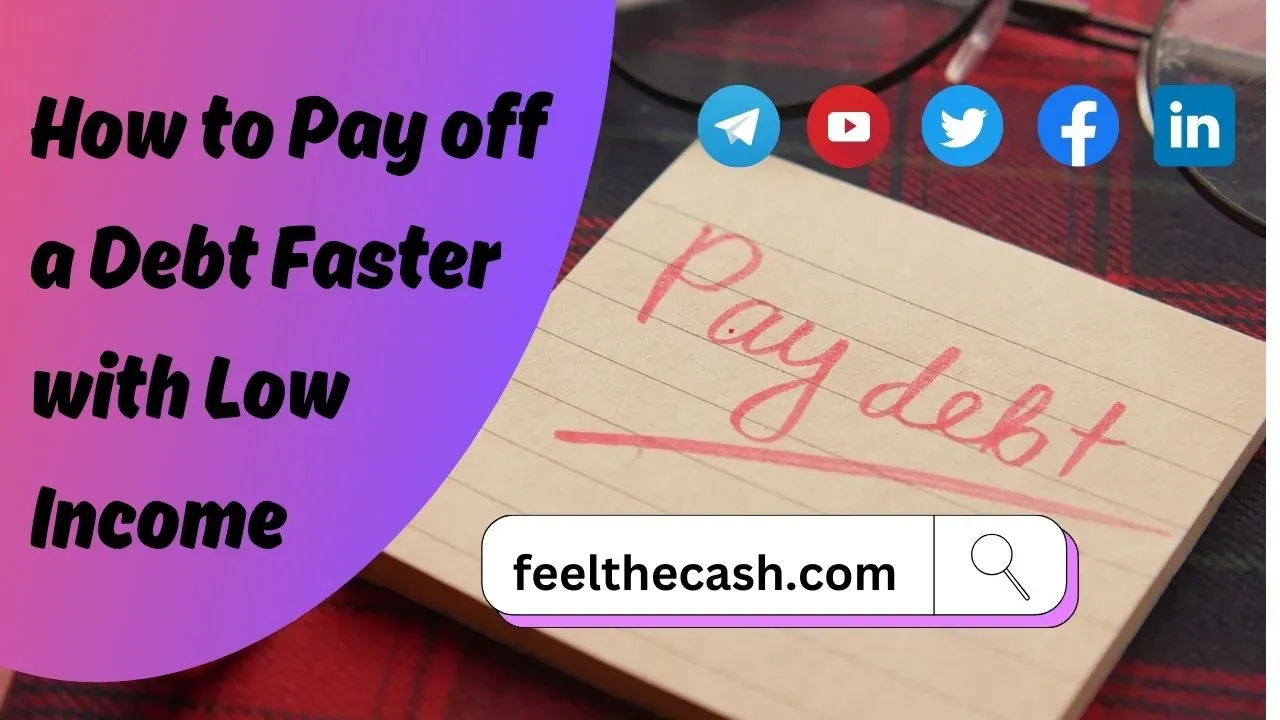
The world of Banking and finance has now been made easy for anyone able to access it. And many more options are still to show up all in the aim of making sending and receieving of money easy.
We are now able to have a bank card where one can withdraw cash without having to pay fees at your bank's ATM; we can send money from one ountry to another; we can have a credited card where we can use and then repay the cash later; and many other things.
But taking more look at the debt sector, banking has made people to be able to borrow cash from them, and thne repay later when they are capable of paying it back. And living with debt can be incredibly burdensome, particularly when you have a low income.
However, it's essential to remember that no matter how limited your resources may be, you can still tackle your debts and achieve financial freedom.
That is why in this article today, we will explore effective strategies you can use to pay off your debts quickly, even on a low income and not have to be in serious problems.
Tackling Debt on a Tight Budget: Strategies to Swiftly Pay off Debt
Well, to do so, you could just simply follow these steps below. They are;
A. Assess Your Financial Situation:
Begin by taking a comprehensive look at your financial position. List all outstanding debts, including credit cards, loans, and any other obligations.
Also, track your income, essential expenses, and discretionary spending. This evaluation will help you identify areas where you can cut expenses and allocate more funds towards debt repayment.
B. Prioritize Debts:
Once you have a clear overview of your financial situation, prioritize your debts based on interest rates or outstanding balances. Two common approaches are:
- High-Interest Debt First: Begin by focusing on the debts that carry the highest interest rates, as they cost you the most. Pay the minimum on all other debts while directing any additional funds towards the high-interest one.q
- Debt Snowball: Alternatively, you could start by paying off the smallest debt first, regardless of the interest rate. Once that is cleared, roll the amounts you were paying on the eliminated debt into the next smallest debt. This method provides a psychological boost as you achieve quick wins, increasing motivation to tackle larger debts.
C. Create a Realistic Budget:
Creating a budget is essential for getting rid of a debt. Keep tabs on your earnings and compile a detailed account of your monthly expenditures. Give housing, utilities, and groceries top priority.
Everywhere feasible, reduce wasteful spending on things like entertainment, subscriptions, and eating out. Put any extra money you have to pay down your debts.
D. Increase Your Income:
To accelerate the debt repayment process, explore other opportunities to boost your income. Consider seeking part-time work, freelancing gigs, or taking up a side hustle. Use any extra money earned to make additional debt payments.
SEE ALSO: How to turn $100 to $1000 easily
E. Negotiate Lower Interest Rates:
Contact your creditors and discuss the possibility of lowering your interest rates. Explain your financial situation and emphasize your commitment to repay the debt.
Lowering interest rates is very important since it can significantly reduce the overall amount you repay, making it easier to pay off the debt faster.
Note that or Keep in mind that Interest rates gotten from borrowed cash at banks are negotiable just that many people have no idea it can be negotiated.
F. Explore Debt Consolidation:
If you have multiple debts with high-interest rates, consider consolidating them into a single loan with a lower interest rate. Debt consolidation can simplify the repayment process and reduce interest charges, helping you pay off debts faster.
G. Make Extra Payments:
Make extra payments whenever you can, even if they're not much. Every little bit helps to lower interest rates and lower the principal amount owed. If you receive bonuses, tax returns, or unforeseen riches, think about utilizing them to make one-time contributions.
H. Seek Assistance Programs:
Research local assistance programs for individuals struggling with debt. Non-profit organizations, credit counseling agencies, or debt management programs may offer guidance or negotiate with creditors on your behalf.
Conclusion or Closing Remarks on Debt Payment with Low Income
Paying off debt on a low income may initially appear daunting, but several methods and procedures have come up to make paying off of debts to be easier. And by implementing these strategies, you can gradually chip away at your obligations and improve your overall financial situation.
Remember, consistency, discipline, and perseverance are key to personal financial success. Revisit your budget periodically, track your progress, and celebrate each milestone, no matter how small.
And knowing the banking and Finance sector very well can make you to know how to tackle them. And so, try and study more about banking with your bank, especially the fact that Interest rates can be negotiated. But also know that if you are very much determined, you'll be debt-free sooner than you think.